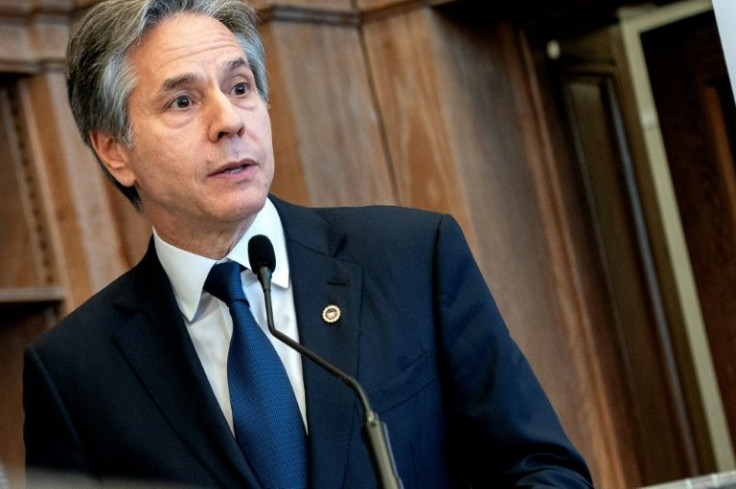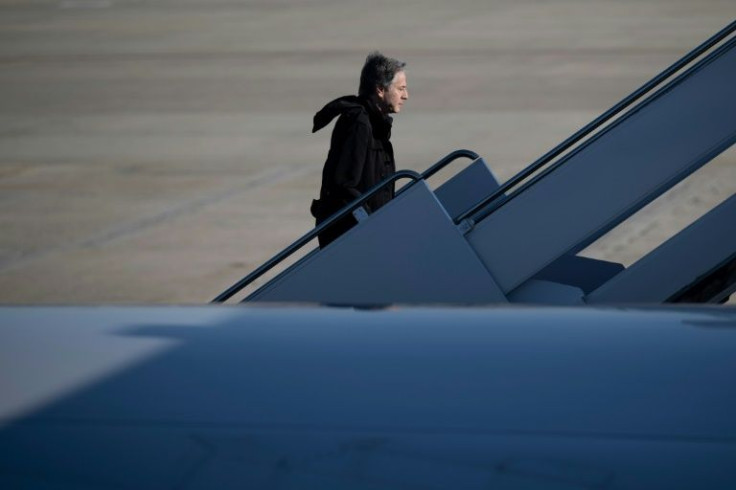Blinken Renews US Focus On Migration With Panama Trip
US Secretary of State Antony Blinken headed Tuesday to Panama on a new diplomatic bid to check migration in Latin America, a rising cause of political headaches despite the global focus on Ukraine.
The top US diplomat's two-day trip, his first to Latin America this year, comes weeks before President Joe Biden's administration ends pandemic restrictions that allowed swift expulsions to Mexico.
Blinken and US Homeland Security Secretary Alejandro Mayorkas will meet Wednesday in Panama City with counterparts from more than 20 countries in the Western Hemisphere to discuss cooperation on migration.
"We must count on close collaboration with governments throughout the region to truly make progress on managing irregular migration and addressing the protection needs of the most vulnerable people in our hemisphere," said Brian Nichols, the top US diplomat for Latin America.
US authorities apprehended more than 221,000 people on the Mexican border in March, the highest for a single month in more than two decades.

The spike comes as people from El Salvador, Guatemala, Haiti and Honduras flee dire poverty, rampant violence and natural disasters aggravated by climate change.
But the United States is far from the only nation experiencing migration strains. Venezuela's economic and political crisis has triggered an exodus of more than six million people, with neighboring Colombia taking the most.
Nichols said the Panama talks, which follow a similar regional meeting in Colombia in October, would seek to boost support to nations that welcome refugees including through multinational institutions.
With Latin America rarely seen as a global security hotspot, the international community spends more than 10 times on each refugee from Syria compared with each Venezuelan migrant, according to a Brookings Institution study.

Attention could drift even further amid the startlingly swift migration from Ukraine, from which more than 4.9 million have fled since Russia invaded on February 24.
"There's going to be less and less appetite from the international community to support migrants in the Western Hemisphere while we have a major migration crisis being provoked by Russia," said Jason Marczak, an expert on Latin America at the Atlantic Council.
"We need to avoid that becoming an afterthought for the global community, so it's really important to have Secretary Blinken along with Secretary Mayorkas there in Panama."
Marczak said the Biden administration was seeking a regional plan so that "no one country is overburdened by higher numbers of migrants, and that countries can maximize the opportunities that migrants present."
Ukrainian refugees have received a warmer welcome in much of the West than did mostly Muslim migrants from Syria and Afghanistan.
Biden has promised to welcome 100,000 Ukrainian refugees, drawing few protests from former president Donald Trump's Republican Party which has generally made opposition to immigration a core issue.
Biden has promised to look at the root causes of migration and take a more humane approach than Trump.
The Biden administration was forced by courts to maintain a Trump policy in which migrants wait in Mexico while their cases are processed, despite criticism from refugee advocates that the arrangement puts vulnerable people in danger.
But the Biden administration on May 23 will end another Trump policy under which the United States cited the Covid-19 crisis to expel migrants summarily without interviewing them.
The end of so-called Title 42, half a year before congressional elections, has been a rallying cry for Republican lawmakers who are ordinarily eager to end pandemic restrictions.
© Copyright AFP {{Year}}. All rights reserved.





















